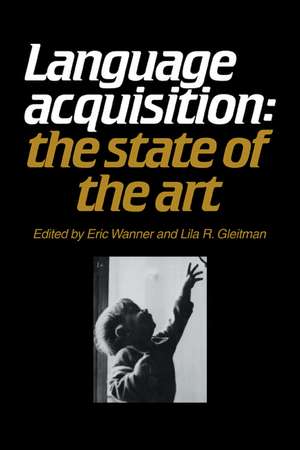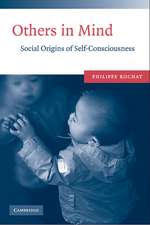Language Acquisition: The State of the Art
Editat de Eric Wanner, Lila R. Gleitmanen Limba Engleză Paperback – 29 dec 1982
Preț: 364.80 lei
Nou
Puncte Express: 547
Preț estimativ în valută:
69.81€ • 73.07$ • 58.10£
69.81€ • 73.07$ • 58.10£
Carte tipărită la comandă
Livrare economică 31 martie-14 aprilie
Preluare comenzi: 021 569.72.76
Specificații
ISBN-13: 9780521282383
ISBN-10: 0521282381
Pagini: 544
Ilustrații: 1
Dimensiuni: 152 x 229 x 31 mm
Greutate: 0.79 kg
Editura: Cambridge University Press
Colecția Cambridge University Press
Locul publicării:New York, United States
ISBN-10: 0521282381
Pagini: 544
Ilustrații: 1
Dimensiuni: 152 x 229 x 31 mm
Greutate: 0.79 kg
Editura: Cambridge University Press
Colecția Cambridge University Press
Locul publicării:New York, United States
Cuprins
List of contributors; Preface; Part I. The Logic of Language Acquisition: 1. Language acquisition: the state of the state of the art Lila R. Gleitman and Eric Wanner; Part II. Preconditions for Language Acquisition: 2. The resilience of recursion: a study of a communication system developed without a conventional language model Susan Goldin-Meadow; 3. Why short subjects are harder to find than long ones Charles Read and Peter Schreiber; 4. On mechanisms of language acquisition: can features of the communicative environment account for development? Marilyn Shatz; 5. Universal and particular in the acquisition of language Dan I. Slobin; Part III. The Development of Grammar: 6. Functionalist approaches to grammar Elizabeth Bates and Brian MacWhinney; 7. On what cases categories there are, why they are, and how they develop: an amalgam of a priori considerations, speculation and evidence from children Martin D. S. Braine and Judith A. Hardy; 8. The child's construction of grammatical categories Michael Maratsos; 9. The role of universals in the acquisition of gerunds Thomas Roeper; 10. A principle theory for language acquisition Kenneth Wexler; Part IV. Semantic and Lexical Development: 11. Reorganisational processes in lexical and syntactic development Melissa Bowerman; 12. Semantic development: the state of the art Susan Carey; 13. The young word maker: a case study of innovation in the child's lexicon Eve V. Clark; Part V. Alternative Conceptions of Acquisition: 14. Some implications of the nonspecific bases of language T. G. Bever; 15. Task specificity in language learning? Evidence from speech perception and American Sign Language Elissa L. Newport; References; Index.
Descriere
This book offers a comprehensive study of language development.














